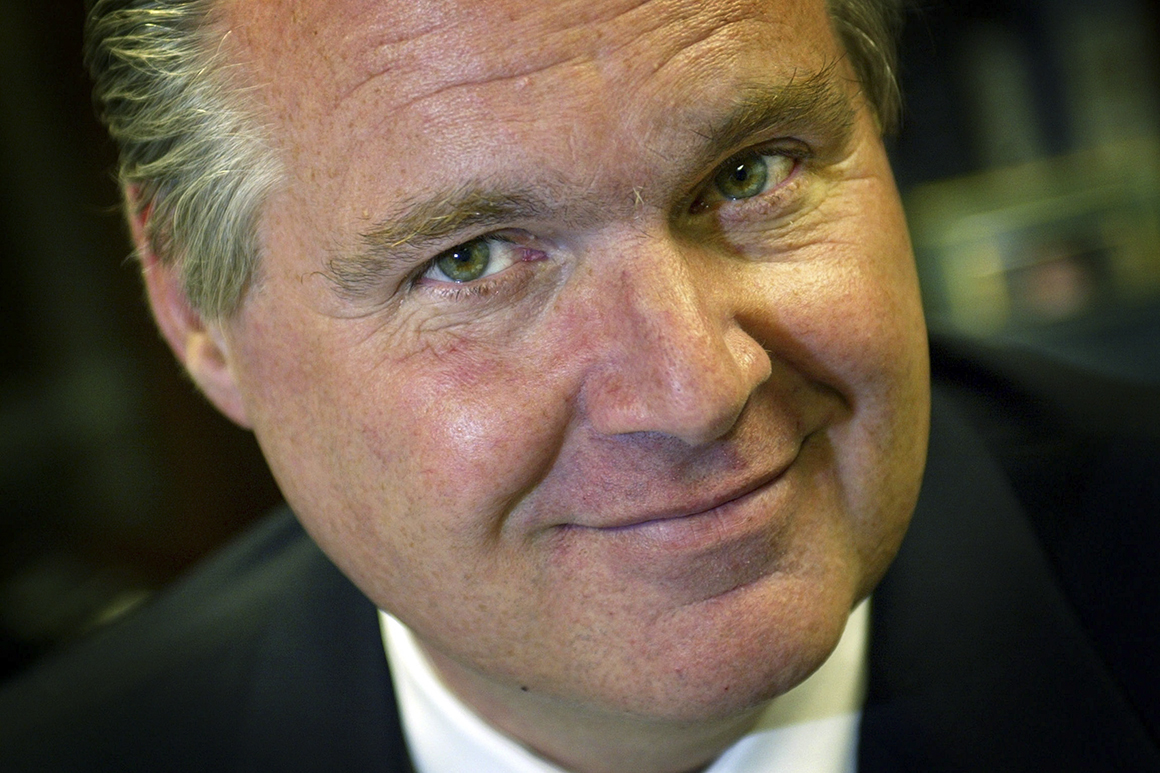
William F. Buckley Jr. made conservatism intellectually respectable by saving it from the wackos and the demagogues. Rush Limbaugh gave it right back again.
In the Age of Trump, Limbaugh might not have been the most important figure, but he was a central player in the devolution of the conservative mind.
Limbaugh, who died this year at age 70 of lung cancer, effectively remade conservatism in his own image as the architect of the entertainment wing that now dominates the GOP. At the peak of his influence, he reached tens of millions of listeners every day, far exceeding his nearest competitor in talk radio. From 1988 until his death, Limbaugh held court for three hours every weekday, thrilling his audience with ribald taunts and a know-it-all’s blustery dismantling of liberal pieties. He was outrageous, occasionally hilarious and immensely influential.
It’s fair to say that without Limbaugh, there would never have been a Trump presidency. But without Limbaugh, you would also not have had a generation of conservative talkers who emulated his populist style. Without Limbaugh, it’s hard to imagine having a Sean Hannity, Mark Levin, Ben Shapiro, Tucker Carlson or Laura Ingraham.
Like his acolytes, Limbaugh was never really a “thought leader” in the conventional sense. He might have begun his career with an apparent goal of popularizing conservative ideas, often using parodies and hyperbole. But — as he often admitted openly — Limbaugh was not really all that interested in ideas, or as it turned out, conservatism.
“I never once talked about conservatism” during the presidential campaign, Limbaugh told his listeners after Trump’s election, “because that isn’t what this is about.” He was quick to jettison ideas of “limited government” and in his later years stopped pretending that he was talking about “conservative” ideas at all. Instead, he was more interested in triggering the libs — whatever that took.
He also created the template that Trump copied so effectively. In many ways, Trump was a creature of talk radio, or as former Barack Obama speechwriter Jon Favreau described him: “Longtime listener, first-time candidate.” Trump won, Favreau wrote, “by doing a fairly good impression of a right-wing media celebrity.”
For years, Limbaugh had channeled his mostly male and mostly white audience’s anger at being mocked by liberal elites for their retrograde beliefs. Trump inherited both Limbaugh’s lexicon (“the world is laughing at us,” you’ve been treated very badly by the liberal media…), and an audience that moved seamlessly from the radio and into the political arena.
As I wrote earlier this year, we now live in the world Limbaugh created, including a political culture that is driven less by facts and ideas than by slurs, rationalizations, conspiracy theories and alternative realities.
Limbaugh could be provocative and funny, but he also introduced and then helped to normalize cruelty, racism and misogyny among a new generation of talkers. He called women “sluts,” mocked people who died of AIDS, and referred to President Obama as the “Magic Negro,” all the while posing as a brave truth-teller who was defying the PC police. In Limbaugh’s world, there was no such thing as racism, only liberal overreaction.
But, perhaps most important, Limbaugh pioneered a style of disinformation that now seems almost routine. In 2015, he defended Trump’s lie that thousands of Muslims in New Jersey had been seen celebrating after the 9/11 attacks. His defense was a major boon to Trump’s campaign, but it was also vintage Limbaugh. The talk show host conceded Trump’s story was false but defended it because it revealed a more important “truth” — that Muslims around the world hated America.
In doing so, Limbaugh began prepping Republicans to rationalize Trump’s many lies.
In his final months, he downplayed the severity of Covid-19, suggesting that it was merely “the common cold” that was being “weaponized against Trump.” He downplayed the importance of the Jan. 6 attack on the Capitol and embraced much of the Big Lie about the 2020 election, openly questioning the legitimacy of Joe Biden’s victory.
One incident seemed to capture both his sophistry and his legacy: In 2020, Trump baselessly suggested that MSNBC host Joe Scarborough might have murdered a young staffer while serving in Congress. Trump ignored pleas from the woman’s husband and others to stop spreading the lie. Even some of Trump’s reliable allies were appalled by the malignancy and cruelty of the attacks. But Limbaugh came to Trump’s defense, rationalizing the lie this way:
“Do you think Trump cares whether Scarborough murdered anybody or not? No, of course he doesn’t care. So why is he tweeting it? Well, because it’s out there. He didn’t make it up. It’s long been out there that this death has something suspicious about it. So, Trump is just throwing gasoline on a fire here, and he’s having fun watching the flames — and he’s having fun watching these holier-than-thou leftist journalists react like their moral sensibilities have been forever rocked and can never recover.”
Limbaugh wanted his audience to think this was the “secret knowledge” that he was passing on: The lie doesn’t matter; moralizing is a joke; cruelty is cleverness.
You can see his legacy all around us.
----------------------------------------
By: Charles Sykes
Title: Rush Limbaugh: The Radio Voice Who Owned the Libs Long Before Trump
Sourced From: www.politico.com/news/magazine/2021/12/27/2021-obituary-rush-limbaugh-520597
Published Date: Mon, 27 Dec 2021 05:00:50 EST






